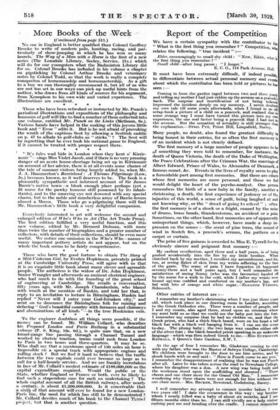To the engineer doubtless all things seem possible, if the
money can be found. Mr. William Collard, who describes his Proposed London and Paris Railway in a substantial volume (P. S. King, 10s. Oci.), is quite sure that, on a new broad-gauge line passing through a Channel Tunnel and worked by electric traction, trains could rush from London to Paris in two hours and three-quarters. It may be so. Who shall say that a maximum speed of 120 miles an hour is impossible on a special track with appropriate engines and rolling stock ? But we find it hard to believe that the traffic between the two capitals could ever become so large as to call for a half-hourly service. And we are frankly incredulous in face of Mr. Collard's modest estimate of £189,000,000 as the capital expenditure required. Would the public or the State, whether England or France or both. ever be lffcely to find such a stupendous sum for such an undertaking? The whole capital account of all the British railways, after nearly a century. is about £1,200,000,000. Is it conceivable that a sixth of that amount will ever be found for a new London- Paris line, the need for which has still to be demonstrated ? Mr. Collard devotes much of his book to the Channel Tunnel project,- but that is another question.


















































 Previous page
Previous page